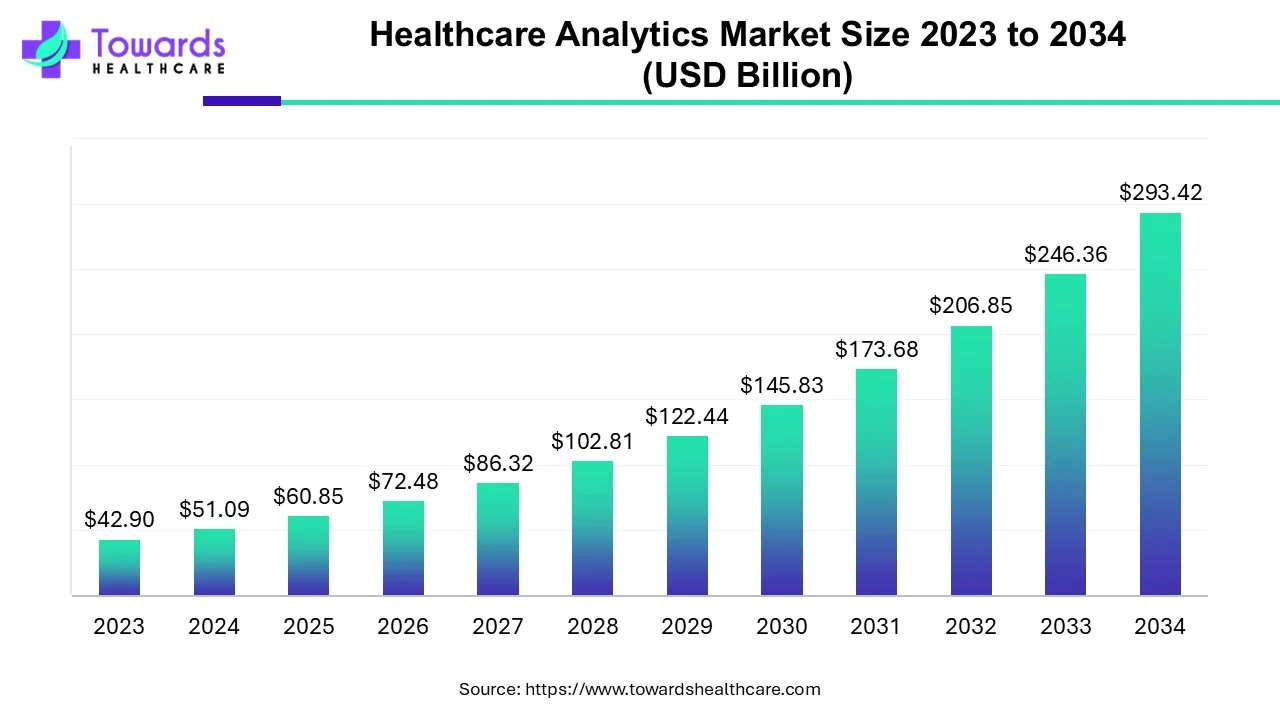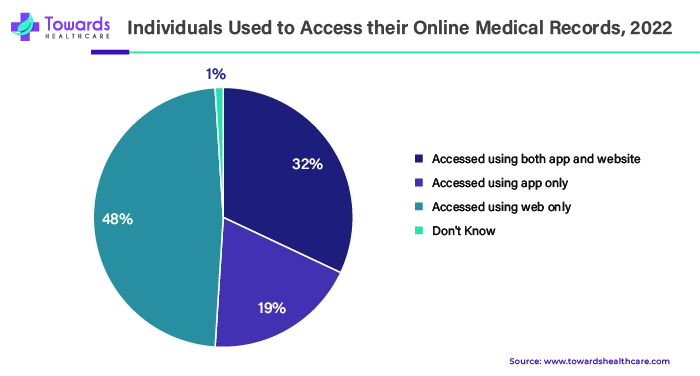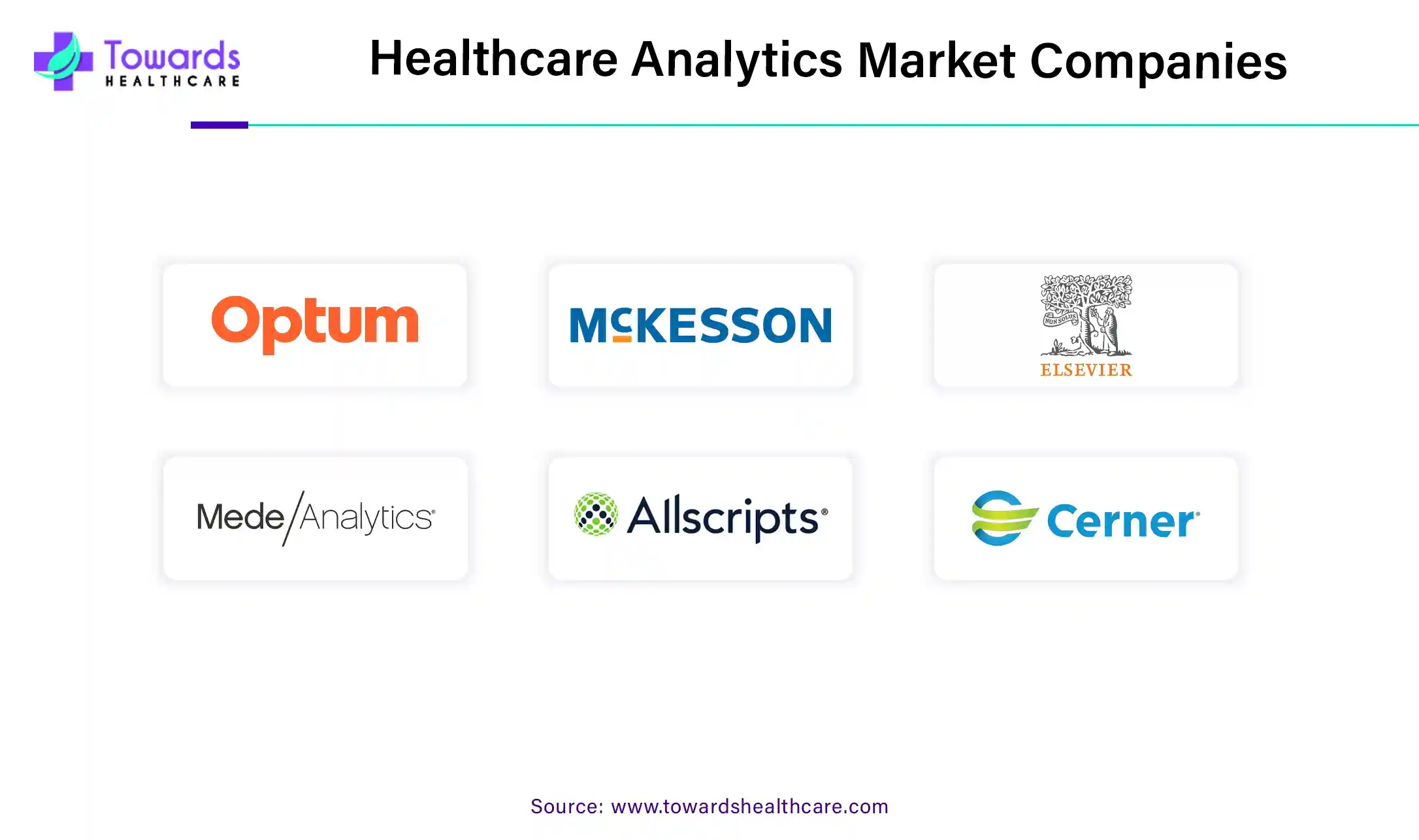February 2026

The healthcare analytics market size is projected to reach USD 293.42 billion by 2034, growing from USD 60.85 billion in 2025, at a CAGR of 19.1% during the forecast period from 2025 to 2034.

In 2021, there was a noticeable surge in demand for Electronic Health Record (EHR) systems, propelled by the growing uptake among office-based physicians. According to data from the Centers for Disease Control and Prevention, 88.2% of office-based physicians were using an EHR system, with 77.8% having a certified system.
Healthcare analytics involves data analysis tools and techniques to gain insights from healthcare data. It encompasses collecting, processing, and interpreting vast amounts of healthcare-related information to improve decision-making, enhance patient care, and optimize operational efficiency within healthcare organizations. Healthcare analytics helps stakeholders, including healthcare providers, administrators, insurers, and policymakers, make informed decisions by identifying patterns, trends, and correlations within data. This data can come from various sources such as electronic health records (EHRs), medical imaging, patient demographics, billing records, and clinical trials.
The importance of healthcare analytics lies in its ability to drive evidence-based decision-making, enabling healthcare organizations to enhance patient outcomes, prevent diseases, and develop personalized treatment plans based on individual patient needs. Healthcare analytics play a crucial role in population health management, enabling healthcare providers to identify and address health disparities, monitor disease outbreaks, and implement preventive interventions on a larger scale. Healthcare analytics contributes to regulatory compliance by ensuring adherence to healthcare standards and guidelines, improving patient safety and quality of care. It also supports risk management and fraud detection by identifying anomalies and irregularities in billing and claim data.
Human error is a major cause of preventable waste in healthcare, leading to significant costs and risks. Recent research estimates that mistakes such as incorrect tests, wrong prescriptions, or errors in patient records can cost US healthcare organizations up to $300 billion annually.
In the UK, the NHS has reported around 237 million prescription errors each year as of 2020, with 28% of these being avoidable. These errors not only pose serious risks to patient safety but also have substantial financial impacts. They contribute to approximately 1,700 deaths and cost the NHS around £98.5 million annually.
Data analytics offers a powerful solution to address these issues. By analyzing prescription patterns, procedures, and dosage ranges, analytics can help identify and prevent human errors. For example, it can predict which demographics might be at higher risk of addiction to certain medications, allowing for better-informed prescription practices that can save lives and reduce costs.
Predictive analytics also plays a crucial role in preventing data breaches caused by human error. Studies indicate that 93% of US healthcare organizations have faced multiple cybersecurity breaches in the past three years. To combat this, many organizations are leveraging analytics to monitor changes in network traffic and behavior, predicting potential vulnerabilities. This helps keep sensitive data and electronic health records (EHRs) secure and protected.
Healthcare is super high-tech, with remarkable technologies and digital tools popping up everywhere. You know those old paper charts your doctor used to keep? They've gone digital, becoming Electronic Health Records (EHRs). These EHRs hold all sorts of details about your medical history, like what illness you've had, what medicines you take, and even your lab test results.
For instance,
But wait, there's more! Have you seen those fancy watches people wear that can track their steps and heartbeats? Those are called wearable devices. They keep tabs on things like how much you move, how well you sleep, and even your blood sugar level, and all of that info can be sent straight to your doctor!

And then there's the Internet of Things (IoT), which sounds super fancy but is just about connecting everyday objects to the Internet. In healthcare, this means stuff like blood pressure monitors, glucose meters, and pill dispensers that can talk to your doctor. They collect data and shoot it over to the folks in charge of keeping you healthy. All the data might sound pretty, but it is also overwhelming. Imagine trying to make sense of a million puzzle pieces all at once! That's where healthcare analytics comes in. It's like having a supersmart computer buddy who can sort through all that data and find the important stuff.
With healthcare analytics, doctors and hospitals can spot trends in how people are getting sick, like if there's suddenly a bunch of flu cases in one area. They can also predict if someone might end up back in the hospital after surgery, so they can step in early and prevent it from happening. But it's not just about fixing problems. Healthcare analytics also helps make things run smoother, like finding where things are getting jammed up in the emergency room or figuring out how to get patients out of the hospital faster. And remember all those rules about keeping your medical info safe and private? Healthcare analytics helps with that, too, ensuring everything stays secure and follows the rules.
One cool thing about healthcare analytics is that it can personalize treatment just for you. By looking at your genes, health habits, and other details, the doctor can personalize the treatments to fit you like a glove, ensuring you get the best care possible.
Governments worldwide are making rules and requirements to ensure that healthcare providers give high-quality care to patients and use money wisely. These rules often include reporting on how well healthcare services are doing and getting paid based on how good their care is rather than just how many patients they see.
For instance,
To follow these rules and get paid properly, healthcare providers need to keep track of a lot of information about their patients and the care they provide. This is where analytics solutions come in. Analytics means using computers to look at all the information and find important patterns or insights that can help improve patient care and make healthcare services more efficient.
So, because governments are making these rules and healthcare providers want to do a good job and get paid properly, they are increasingly using analytics solutions to help them keep track of everything and make better decisions about patient care.
In healthcare, a vital tool known as healthcare analytics plays a pivotal role in guiding doctors and other professionals toward more informed decision-making. Picture it like this: if you were solving a puzzle, instead of relying on guesswork, you have a detailed map showing you the most efficient route. Healthcare analytics serves as this map, offering a comprehensive overview of patient conditions, treatment outcomes, and hospital operations.
Healthcare analytics delves into past treatments and patient responses, akin to examining a collection of stories to discern the outcomes. By analyzing this data, doctors can forecast which treatments will likely be most effective for individual patients. This predictive capability enables healthcare providers to make smarter decisions from the outset rather than resorting to trial and error.
Healthcare analytics enhances decision-making processes by providing insights akin to planning a large gathering. Rather than estimating food and beverage quantities, one would assess the number of attendees and their preferences. Similarly, healthcare analytics assists hospitals and clinics in making informed choices about patient care.
For instance,
Healthcare analytics contributes to streamlining operations within healthcare facilities, organizing a room for optimal efficiency. It assists in tasks such as staff scheduling to ensure adequate patient care and efficient equipment utilization, thereby minimizing waste. This organized approach allows hospitals to function smoothly, maximizing resource allocation and efficiency.
Imagine you're trying to solve a puzzle, but some pieces need to be included or corrected. Similarly, in healthcare analytics, we try to understand important information from data, but sometimes, the data needs to be corrected or completed, making it like a puzzle with missing pieces. Healthcare data comes from electronic health records, medical devices, and administrative systems. Each source has its own way of organizing information, which can lead to errors or inconsistencies.
For instance,
When we analyze this data, if it needs to be more accurate or complete, we might come up with the wrong conclusion. This can affect how doctors treat patients, how hospitals run, and how decisions are made about healthcare policies. To ensure the data is of good quality, we need to do a few things: ensure that the data is accurate and matches what it should be. We also need to make sure the data is organized consistently so that it's easy to analyze. We need to keep an eye on the data over time to make sure it stays accurate and up-to-date.
By doing all of these things, we can ensure that the data we use for healthcare analytics is reliable and helps us make better decisions for patients and the healthcare system.
North America is a hub for technological innovation, with a thriving ecosystem of healthcare IT companies, research institutions and startups. This fosters the development of innovative analytics solutions customized to the needs of healthcare providers, payers and other stakeholders. Advanced technologies such as artificial intelligence (AI), machine learning, and big data analytics are increasingly integrated into healthcare analytics platforms to unlock actionable insights from vast datasets. Regulatory frameworks, including healthcare privacy laws such as the Health Insurance Portability and Accountability Act (HIPAA) in the United States and similar regulations in Canada, significantly shape the healthcare analytics market.
In Asia Pacific, healthcare analytics has a lot of potential because the region has a large population and diverse healthcare systems. Countries like China and India are investing more in healthcare technology, which creates opportunities for companies that provide healthcare analytics solutions. This market is growing because more hospitals and healthcare companies are realizing the importance of using data to make better decisions about patient care, treatments and how hospitals are run. It's similar to how businesses use data to understand customers and improve their products or services.
The healthcare system of India is undergoing a digital transformation, growing through technological advancements, policy reforms, and government initiatives. Along with a quickly growing population and growing demand for digital health solutions, quality healthcare is playing a significant role in improving affordability, accessibility, and efficiency of the treatment. Government initiatives such as CoWIN App, Ayushman Bharat Digital Mission, e-Sanjeevani, Aarogya Setu, and e-Hospital have made healthcare solutions and services reach every part of India, which drives the growth of the healthcare analytics market.
The competitive landscape in the healthcare analytics market is dynamic, with companies constantly innovating and evolving their offerings to stay ahead of the competition. Different companies compete to offer the best tools and services to help hospitals and healthcare providers make sense of their data. It's like a race where companies try to outdo each other to provide the most effective solutions for analyzing healthcare data. The big IT companies offer various tools and services, such as software platforms, data analysis algorithms, and consulting services, all aimed at helping healthcare providers make better decisions based on their data. It's similar to how different brands compete to offer the best smartphones or computers, but in this case, it's about healthcare technology.
Recently, healthcare analytics has gained prominence to improve patient and medical services, as well as an efficient and affordable tool. It is gaining prominence due to the Big Data phenomenon’s rise in the healthcare arena. It provides predictive analytics, tailored treatments, and early identification capabilities. Various hospitals generate huge amounts of data about staffing levels, bed occupancy, and resource allocation. Data analytics in medical care analyzes this data to optimize hospital operations for better efficiency, which drives the growth of the market.
AI instance,

By Component
By Type
By Application
By Delivery Mode
By End User
By Geography
February 2026
February 2026
December 2025
December 2025